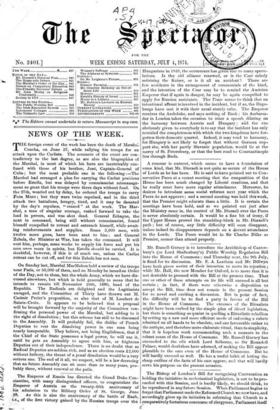Mr. Russell Gurney is to introduce the Archbishop of Canter-
bury's (or Lord Shaftesbury's) Public Worship Regulation Bill into the House of Commons ; and Thursday next, the 9th July, is fixed for its discussion. Mr. E. A. Leatham and Mr. Dillwyn have both riven notice of their intention to move its rejection ; while Mr. Hall, the new Member for Oxford, is to move that it is not desirable to proceed with the Bill at the present time. That one or other of these attempts on its life will succeed is all but certain ; in fact, if there were otherwise a disposition to accept the Bill, time does not remain in the present Session for so novel and exciting a discussion. But in point of fact, the difficulty will be to find a party in favour of the Bill in the House of Commons. The excesses of the Ritualists might have been curbed by the simple plan of direct legislation, but there is something so quaint in quelling a Ritualistic rebellion by setting up a new and more efficient mode of enforcing a rubric admitted on all hands to be obsolete, and one favourable rather to the antique, and therefore more elaborate ritual, than to simplicity, that it is hopeless work recommending such a measure to the robust sense of the House of Commons. Mr. Russell Gurney has succeeded to the role which Lord Selborne, as Sir Roundell Palmer, would doubtless have adorned, of making the Bill appear plausible to the ears even of the House of Commons. But he will hardly succeed as well. He has a useful habit of letting the sharp outline of the facts of his case appear, and that will hardly serve his purpose on the present occasion.


































